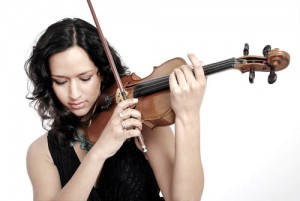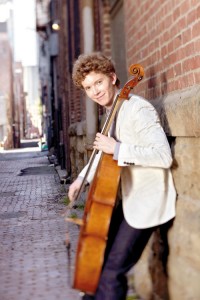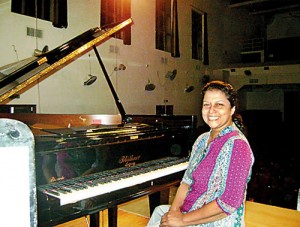Awaiting a musical adventure
Ramya de Livera Perera is one of the best known and respected music teachers and pianists in the country. Her one-time student, Mandhira de Saram, is famous in her own right as a passionate and soulful violinist, not counting the musical legacy she claims as a de Saram. Put these two powerfully musical women on a stage together with one of the world’s best known cellists, Joshua Roman, and the evening promises to be no less than an exquisite display of what stringed instruments are capable of doing to the human auditory sensors.

Mandhira de Saram: Pushing the boundaries
Joshua Roman will perform in Sri Lanka on February 15 at the Lionel Wendt when together with violinist Mandhira and pianist Ramya, he will present an interesting programme of the familiar and not-so-familiar, the classical and the contemporary, the promise of an exciting listening experience for the benefit of the Sunera Foundation.
The last (and first) time Sri Lanka heard Joshua Roman live was in 2011 when he played a benefit concert for Sunera with Eshantha Pieris. The programme was presented both in Kandy and Colombo, a previously not experienced level of performance on piano and cello with a selection of familiar classics combined with refreshing contemporary pieces.
Since then, the cellist has been exploring composition and conducting, while often performing in collaboration with other artists. Possibly the most interesting of his recent collaborations is the production of acclaimed actress Anna Deavere Smith’s play On Grace. Roman developed most of the music for this two-person theatrical-musical production

Joshua Roman: Excited about the concert
evolved in major cities in the US (including San Francisco where the project began, Washington D.C. and Chicago), a process he called “extremely inspiring”.
Roman has also recently worked with artist Anne Patterson, performing for the unveiling of her Graced with Light installation at Grace Cathedral in San Francisco. He hopes that these cross-medium collaborations have helped him “find ways to be more in tune with the interpretive process and communicate with the audience as fluently as possible”.
While Roman has been experimenting with mixing his music and other mediums and forms of art, our very own Mandhira de Saram, based in the UK but working around the world, has been doing some collaboration across genres. The last time we heard Mandhira in Sri Lanka was also in 2011 when she collaborated with pianist Eshantha Pieris on a programme of standard classical compositions for violin and piano. But her recent work has been focused on her band, the Ligeti Quartet, which, dedicating itself to the “brand new” in music performance is “rapidly making a name for themselves” and “a mark in music”, according to the Oxford Times and the Birmingham Post. She has also recently been involved in collaborations with electronic artists and jazz musicians, pushing the boundaries of genre and style that are often bred into classically-trained musicians.
Mandhira was, in fact, first introduced to classical piano repertoire by the third part of the trio for the night of February 15, Ramya de Livera Perera. Mandhira expects that “it will be lovely” to perform with her teacher “as an adult” and that “perhaps” the pupil has “learnt to be less bossy now, than [at] five years old!”
Ramya remembers very clearly that Mandhira was not simply a talented musician, but also “unusually creative” in her musical expression at a “very very young age”. “I am very excited to play with these young musicians,” she says. As a primarily classical-focused musician from a different generation, Roman’s and Mandhira’s interpretation of the music is something Ramya is looking forward to experiencing. “I expect to be refreshed,” she laughs.
Ramya will in fact perform only two of the six numbers on the programme for the evening, the first of which will be Maurice Ravel’s Etude en Style de Habenera, a duo for violin and piano. The second will be Dimitri Shostakovitch’s Trio No. 2, a haunting retelling of the plight of the Jewish nation, written during the war-times of 1944 in vivid sound-pictures and requiring technical prowess from all three instruments.

Ramya de Livera Perera: Expecting to be refreshed
Roman, probably the premier cellist of his generation, will also play from Bach’s Six Suites for Unaccompanied Cello while Mandhira will perform J. S. Bach’s well known Sarabande in D minor as well as a Recitativo and Scherzo by Fritz Kreisler. Possibly seconded only by the drama of the Shostakovitch will be the duo for violin and cello by Zoltan Kodaly, brought together in Roman’s technical prowess and relaxed confidence combined with Mandhira’s well-known passionate delivery.
While Roman and Mandhira have not performed together before, they are agreed in their excitement for the project. Both artists are well experienced in such collaborations and look forward to the “surprises”, as Mandhira phrases it, of what Roman believes is “an adventure to look forward to”. The programme, Ramya promises, showcases the full capacity of each instrument, making it surely worth attention if not great excitement.
“I’m excited to be collaborating with even more Sri Lanka musicians,”Roman said, “…[and to] hopefully inspire a sense of goodwill and at the same time give the audience a venue to explore their own emotions through music.” But mostly, he is excited to raise money for the organisers, the Sunera Foundation, a programme whose work moves him and motivates him to see potential in the arts beyond entertainment.
The concert is at the Lionel Wendt Theatre on Sunday, February 15 at 7.30 p.m. Tickets are now available at the
theatre.


